The Season 7 is probably the most exciting of the entire series and also at the same time the easiest to understand. The storylines have been significantly reduced. In the past seasons, the seven royal houses, the wall and Essos had to be treated. This has now been reduced to Cersei, Daenerys and the Night King. At the same time, the complexity has decreased. Viewers can thus focus their mental capacity on other things – for example, trying to recognize the deeper meaning of dialogues, absorbing the excellent facial expressions of the actors or admiring the architecture of old buildings. The plot of cinematographic films always has a more or less good dramaturgic structure. In series, this can also be stretched over several episodes. This creates tension. Cheap series can be recognized by the fact that each episode is closed in itself and thus they have no overall strand. GoT 7.x is characterized by two dramaturgical fields. On the one hand, it is the action itself in Westeros and, on the other hand, it is the arrangement of events across the episodes. In both cases, the path follows a line. This starts at a lower level and begins to rise steeply, triggered by a small event. The rise is in turn interrupted by an insignificant event, called inflection point, and the break-down begins. At the end the line reaches again a reason which represents a new basis. This can also be lower than the initial state. I call this line a Zeitgeist curve. It can be recognized in many small situations. Even larger epochal events are similar. GoT is very well suited to study this phenomenon. You have fun and at the same time learn about societies, technological and cultural developments. The picture shows the basic structure.
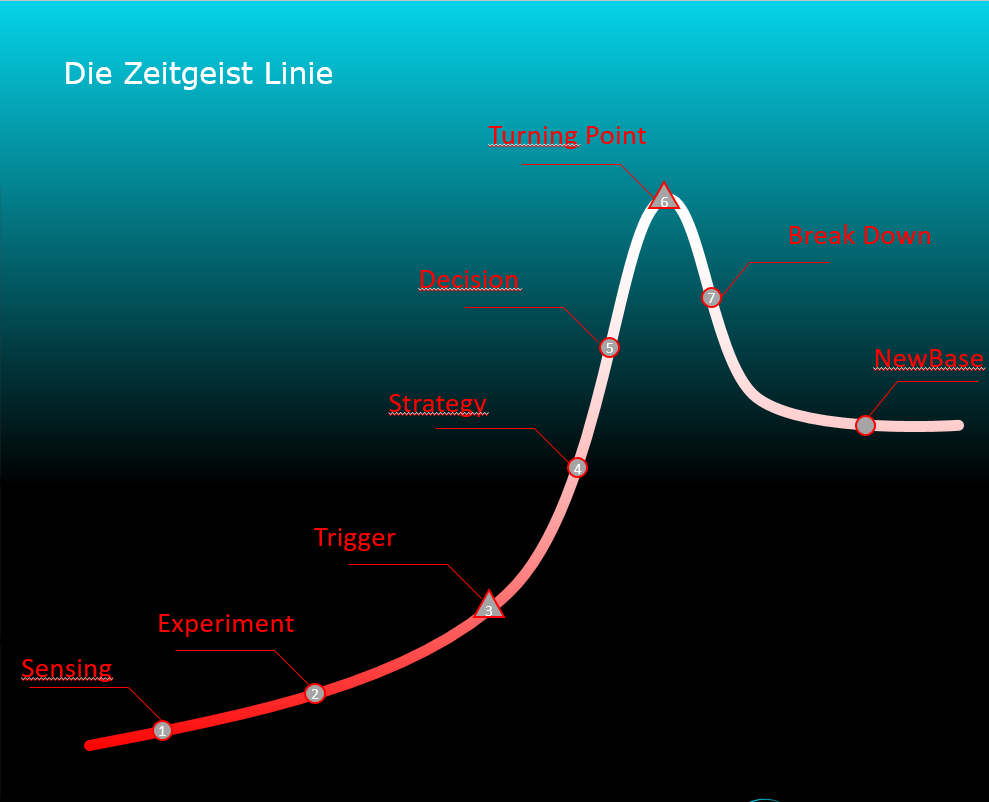
- Sensing: The situation is stable. People go about their usual everyday life. But in this quiet phase there is also the potential for something new. A few, creative and sentient beings feel that something new is developing. Mostly they do not know exactly what, but such a guess becomes clearer. This has nothing to do with divination. People with such abilities live intensively in the “here and now”. They are very much connected with their work, family, nature, etc. So they are not philosophers, gurus or futurologists. The intense life with simultaneous peace and closeness lead to the ability to partially anticipate the future. Most people like Steve Jobs, J.F. Kennedy, Thomas A. Edison asked on the stage. Surely you have ever had the feeling to know exactly what is coming. The “flow” according to Chiksentmihaeli or the “Sensing” after Otto Scharmer are scientific explanations for this. In episode 1 we experience many of the necessary skills for “sensing”. Aria has divine abilities, Daenerys has resources – Cersei has the allies, and Jon is the sentient leader.
- Experiment: When people are in crisis, they fall back on the tried and tested. At such times, nobody has the time to think or try something new. In quieter times, the mind can develop better. People try something out, discard it or keep it upright. The spiritual stress of the Middle Ages, triggered by the Church, has hardly allowed anything else. Only the freedom movement through the Renaissance in the northern Italian city states has brought about changes. These were then very massive and formed the basis for science and technology. But there is a difference between trial / error and experiment. Attempt / error is not purposeful but happens by chance. An evolutionary process where established methods happen to be implemented somewhat differently. It has then been shown that these are better than the previous one. An experiment is the targeted further development of a process. Each pass only changes one condition or variable, and the result is measured and documented. In Episode 2, Sam experiments with Jorah Mormont’s white-tooth disease and Cersei builds a scorpion (giant crossbow) to arm himself against the dragons.
- Trigger: Mostly it is small, unobtrusive causes that cause great effects. Unfortunately we are hardly able to recognize these events. Could we do that because we would avoid a lot of unpleasantness. The sentence: “If I had then ….” Is often heard. In fact, many infinite events occur at the same time, of which only a few take on a major impact. This is due to the predominantly negative feedback of the system element. Even when something serious happens, it curbs its reproduction. In the few cases where there is a successive positive / reinforcing feedback, there are great consequences. What it takes is:
- An immaterial cause
- A carrier medium
- A small world network architecture
- A recognizable behavior
- A material impact
Some little episodes from Episode 3 are knights armor without warming leather, too small granaries, Sam has to write off, among other things.
- Aktion: Once the trigger is triggered, the events begin to roll over. It starts a steep growth. It should actually be time to forge strategies and then implement them. In fact, it is an actionism. The one from the Middle Ages differs markedly from the one we have today. At GoT nobody was allowed to trust anyone, everything had a personal connection, leadership was emotionally charged and the appearance led to decisions. Today it is trust, sustainability, cognition, objectivity and much more. Niccolo Machiavelli is the reference model for Tyrion Lannister.
- Decision: After a period of almost unrestrained growth, development slows down. It takes more effort to sustain growth. Now wise decisions are needed. Decisions are made in the field of tension of meaning and acceptance. Daenerys makes decisions of high importance, but needs little acceptance. Jon Schnee also makes far-reaching decisions but needs the approval of the Norsemen. Little important and of no acceptance need be the decisions of the Master of Maester.
- Turning Point: After a rise, even if it took so long, comes a collapse. Probably the longest existing system in human history were the Egyptian pharaonic dynasties. As we know, these too have disappeared. After a longer ascending period it becomes more and more difficult to get the system like this. Again, there may be insignificant triggers that trigger a crash. Mindfulness can protect against such unwanted developments. The more reflection, the better mindfulness and the less action this less. In the “sea of possibilities” there are endless combinations. Actions that are accompanied by emotionality and attract little reflection increase quickly and unintentionally.
- Break Down: Once friends leave you, David wins against Goliath, game rules change without you knowing, then you’re probably in a system that is about to expire. Cersei had to hear that too when Jamie left her and she was really scared. The revenant has gone very close to her at least for a short time. In the phase of upheaval, there is no justice, except “we create it”. Ultimately, it also comes to physical destruction. Even if the break down was triggered by a spiritual revolution, as is shown in every warlike conflict. Personally, one usually experiences an overconfidence in this phase. This has been learned in the growth.
- New Base: The New Base may be lower or higher than the level before the expansion. We have already experienced both in human history. While in Greek antiquity it was already quite clear that the earth was a sphere, people were still executed in the Middle Ages. Stock prices are a good example in the new era. The prices can be much lower after an increase than before, which many investors have already felt painful. Sometimes time does something right but not always. The time of Petyr Baelish has probably expired. It is pure speculation to believe he would come into play again as a Revenant.
Now have a lot of fun and insights in season 7.x
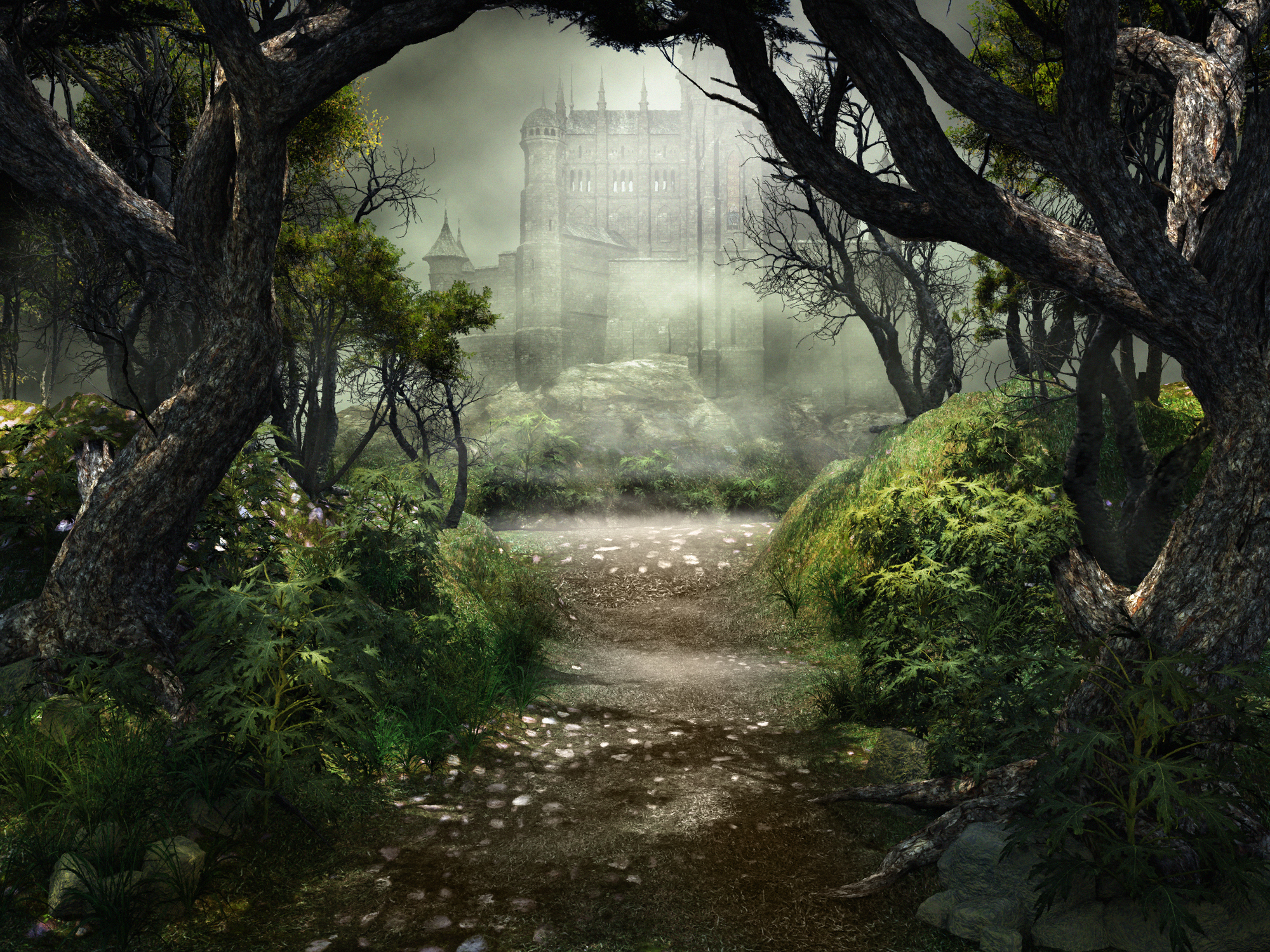

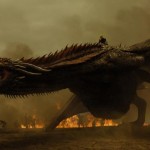
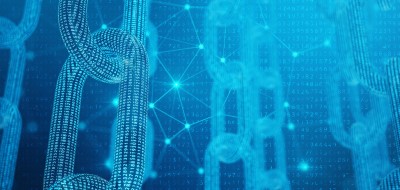

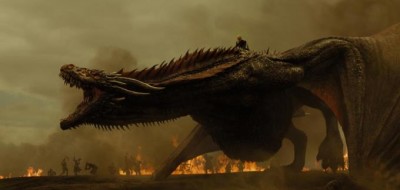

 Deutsch
Deutsch English
English